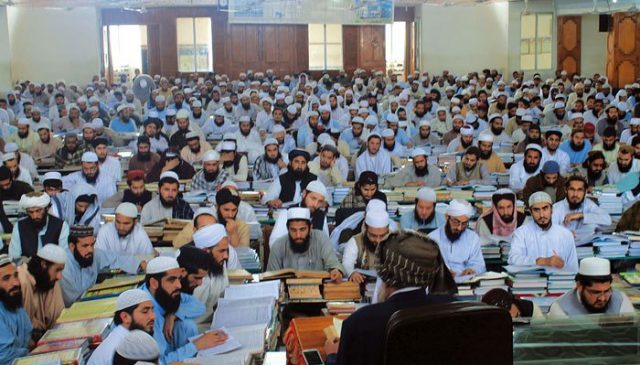News Analysis |
In a seemingly controversial move, Pakistan Tehreek-e-Insaf (PTI) led Khyber Pakhtunkhwa (KP) government is expected to release Rs. 227 million for Maulana Sami-ul Haq’s seminary Darul Uloom Haqqania.
Interestingly, Sami-ul Haq is a political ally of PTI and a much-criticized controversial pro-Taliban leader. According to the officially released figures, the funding to the seminary has increased to Rs. 577 million from Rs. 300 million allocated earlier.
The PTI government allocated Rs. 300 million for the seminary from the financial year (FY) 2016-17 citing the party policy of mainstreaming madrassah education. Pakistan People’s Party had ferociously criticized PTI and condemned its decision last year saying it would legitimize militancy and militant Taliban in the province by providing such funding to a controversial privately run seminary.
In such an environment, donating additional money to Darul Uloom Haqqania, which is known as ‘Jihad University’ may look questionable. The US is aware of the role played by this institution in creating thousands of jihad militants to fight Soviet Invasion of Afghanistan.
Despite earlier criticism Khan had defended the decision and termed it a way to keep them away from radicalization. Khan told Geo news in an interview that same Islamic institution was supported and financed by the Awami National Party (ANP), but no such questions were raised.
This seminary is located in Nowshera district and is believed to be the place where most of the Taliban leaders were educated, which are now leading different factions of Taliban. Among the alumni of the seminary, some of the notable people include Nadir alias Qari Ismail, Abdullah alias Saddam, Rasheed alias Turabi and Faiz Muhammad who are the main accused in the murder of former Prime Minister Benazir Bhutto. It is the reason, which justifies PPP’s fierce criticism of the move.
Read more: Ayesha Gulalai set to launch PTI-Gulalai on Friday
The intention of the PTI government is to introduce educational reforms. The seminary trusted PTI according to officials’ statement of the party, otherwise, it had earlier rejected the offer of reforms under General Pervez Musharraf. Moreover, in order to curb terrorism, the federal government announced to unveil new policy measures for mainstreaming religious seminaries soon.
In January, a high-level meeting took place where senior officials of the higher education commission, national security advisor, and many other officials attended and reviewed the progress of madrassah reforms. The initiative of reform is the part of the 20-point National Action Plan (NAP), which was designed to uproot and fight terrorism after the brutal attack on Army Public School in 2014.
Pakistan is accused of failing to comply with the global anti-money laundering and terror financing requirements and will be put on the terror watch-list or so-called grey list from June 2018.
But critics were of the view that PTI released the fund to gather political support for the party in the upcoming Senate elections on March 3. The KP government is fiercely challenged for indulging in such an act when Pakistan is facing backlash for not doing enough against the war on terror. Pakistan is accused of failing to comply with the global anti-money laundering and terror financing requirements and will be put on the terror watch-list or so-called grey list from June 2018.
Read more: Is PTI facing an existential crisis?
In such an environment, donating additional money to Darul Uloom Haqqania, which is known as ‘Jihad University’ may look questionable. The US is aware of the role played by this institution in creating thousands of jihad militants to fight Soviet Invasion of Afghanistan.
In such a scenario, apparently, more of a guarded approach should have been adopted. It may not send a positive signal abroad, where hostile elements are already making efforts to discredit Pakistan’s efforts against terrorism. It may give a political leverage to PTI and may improve the lives of the students struggling to integrate with society, but can seriously backfire, if not properly scrutinized.














